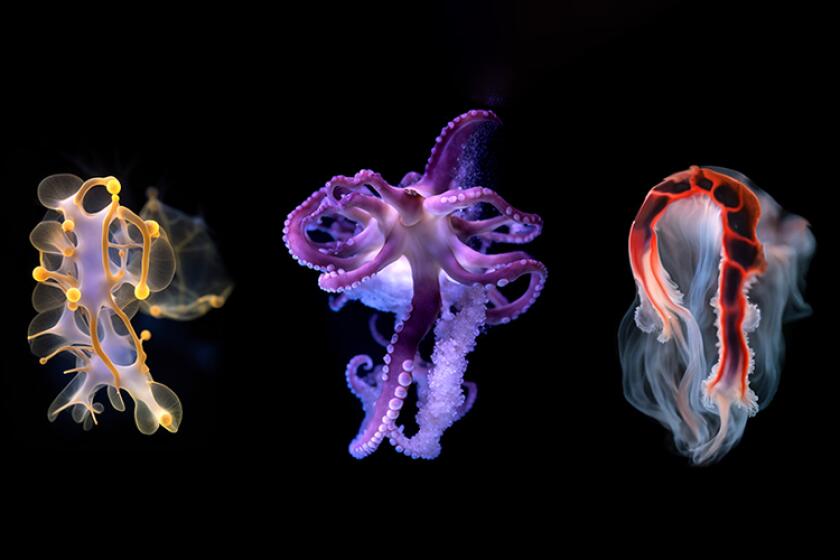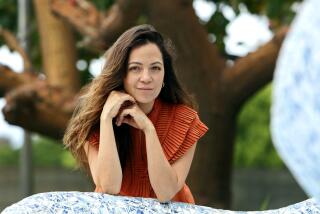Review: Dudamel is finally back at the Bowl and blissfully all over the musical map

- Share via
In the final week of the 2005 Hollywood Bowl season, a baby-faced conductor made his U.S. debut facing a weary Los Angeles Philharmonic in a program that ended with Tchaikovsky’s Fifth Symphony. If the performance was “a tad cautious,” perhaps that’s because the 24-year-old maestro had a police helicopter buzzing throughout the first movement and a car alarm blasting out a 4/4 rhythm during the third movement’s 3/4 waltz.
Even so, it was a remarkable evening, enlivening orchestra and audience alike and becoming one for the Hollywood Bowl history books. Four years later that same conductor was back making history at the Bowl by conducting Beethoven’s Ninth Symphony in a special free concert. Broadcast around the world, “¡Bienvenido Gustavo!” launched Gustavo Dudamel’s music directorship of the L.A. Phil.
Dudamel has returned to the Bowl to conduct the last two weeks of this summer season in what is now his Hollywood Bowl. Both those landmark concerts are clearly on his mind. He began again with Tchaikovsky’s Fifth. He conducts Beethoven’s Ninth on Tuesday night.
In an interview from Salzburg, Gustavo Dudamel talks about what Los Angeles means to him and addresses the perception that he’s no longer focused on the city that launched his career.
It has been a long while since Dudamel appeared a tad cautious at the Bowl, where he now seems open to just about anything. Even for this venturesome music director, these two weeks are unlike any other he has had at the Bowl, unlike any two weeks he or anyone would dare anywhere else. Clearly on Dudamel’s mind is the fact that he will be giving up the Bowl after the summer of 2026, when he becomes music director of the New York Philharmonic, although he says he plans to return as a guest every summer.
At the moment, though, Dudamel is closing out the last 15 days of the Bowl summer with six wildly different programs. By my estimate, more than 125,000 people will have attended the sold-out weekend pop-oriented programs and Tuesday and Thursday classical concerts. The L.A. Phil no longer provides attendance figures, but these are numbers that pop stars and politicians might envy.
What is even more astonishing is that such vastly different programs attract such vastly difference audiences. I may have been one of the very few people, other than L.A. Phil and Bowl officials, who attended them all. In fact, I wasn’t always sure what I was doing there, but Dudamel was ever in his element.
The Tchaikovsky was bold, bracing, playful, furious, propulsive, exquisite in its detailing, played with fire and passion. Caution was not thrown to the wind, but a bracing sense of spontaneity brought freshness and a kind of excitement that Dudamel implied 19 years ago but could not yet fully implement.
What was a tad curiously cautious was the playing of Yunchan Lim, the 20-year-old Korean pianist, as soloist in Beethoven’s “Emperor” Concerto that came before the Tchaikovsky. While Lim’s mature eloquence was never in question, the surety and exquisite beauty of his playing in impressive display, his was a perfectionist performance of getting everything to work just right. He’s a huge talent and got ideal support from Dudamel. But he’s too soon a star.
The next night in front of a raucously dissimilar crowd, Dudamel commanded the L.A. Phil in the world premiere of “Marvel Studios’ Infinity Saga Concert Experience.” Action scenes from 25 Marvel movies covered video screens big and small. Immersive lighting and projections took over the shell. The music was loud. The sound effects were loud. The crowd ate it up and picked up merch like Marvel was going out of business.
Dudamel didn’t have to do this. He obviously wanted to and looked like he was having a great time. But this show will go on the road with other conductors, and that may not matter to most Marvel fans. If you aren’t a Marvel fan, the music doesn’t matter much. I left at intermission.
The much-anticipated reopening of the Mark Taper Forum, ‘Lightscape’ at Disney Hall, a big debut in San Diego: Here’s our shortlist to the most promising shows in the season ahead.
Last weekend’s sold-out concerts were a completely different scene. With the exception of John Adams’ “Short Ride in Fast Machine,” in the most thrilling performance of the much-played concert opener I’ve heard, the long evening was devoted to Mexican music, highlighted by Natalia Lafourcade. She sang a nearly 90-minute set of her songs accompanied by the L.A. Phil but also in a cabaret setting at the end.
Unlike the Marvel program, fueled by violent testosterone, Lafourcade brought a decidedly intimate and personal warmth. Even without translations, her songs enchanted.
There were also orchestral dance scores written in 2017 by Arturo Márquez (“Danzón No. 9”) and Gabriela Ortiz (“Antrópolis), two composers from Mexico City whom Dudamel has championed. Both had the audience practically on its feet. Dudamel commissioned and premiered “Danzón No. 9.” “Antrópolis,” which captures the aura of dance halls in 1980s Mexico City, was written for Carlos Miguel Prieto, who also conducted earlier this season at the Bowl.
In between these big weekends, Dudamel led a quirky program that began with a jokey but spectacular performance of Saint-Saëns’ “Carnival of the Animals,” with pianists Sergio Tiempo and Karin Lechner, along with animated film and enchanting narrations by Dudamel’s son, Martín.
The second half, Dudamel told the audience, included excerpts from an opera about sex and cigarettes and murder that Martín wasn’t allowed to narrate. These brief excerpts from “Carmen,” featuring mezzo-soprano Rihab Chaieb, had an arresting degree of vivacity and lust that would be hard to match. If Dudamel, as he surely will want to, performs opera when he goes to the New York Philharmonic, the Metropolitan Opera, across the plaza, will have something to worry about.
The latest installment of Pacific Standard Time, the museum series that this year is titled ‘PST Art: Art & Science collide,’ has arrived. Here’s our shortlist of exhibitions and events.
At 43, Dudamel is a conductor in transition. He may never again have such generous opportunities elsewhere to offer so much for so many. New York is hoping for another Bernstein. What it’s getting is an L.A. Dudamel, which is, as these two weeks at the Bowl show, not the same thing. New York will get a sample next month when Dudamel takes the L.A. Phil to Carnegie Hall for three concerts, including the Mexican program with Lafourcade.
But Dudamel does, in fact, have a potent Bernstein message for the Bowl. He will precede Beethoven’s Ninth with Bernstein’s “Chichester Psalms” at the Bowl on Tuesday, optimistic works with calls for brotherhood, community and nonaggression coincidentally coming directly after a presidential debate.
More to Read
The biggest entertainment stories
Get our big stories about Hollywood, film, television, music, arts, culture and more right in your inbox as soon as they publish.
You may occasionally receive promotional content from the Los Angeles Times.














